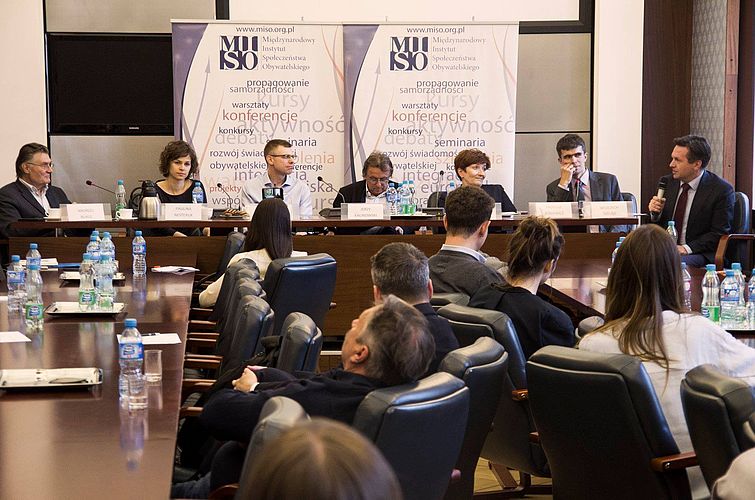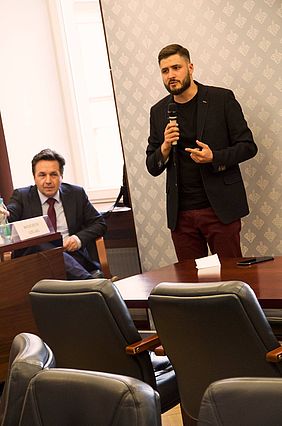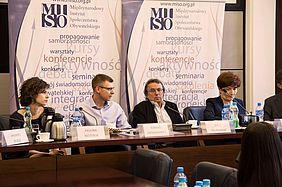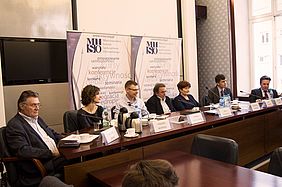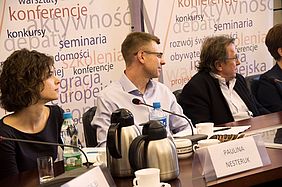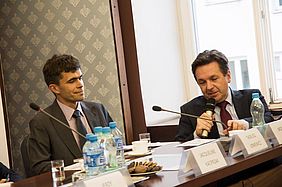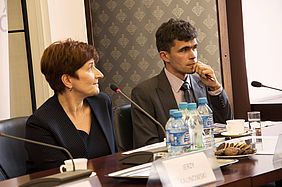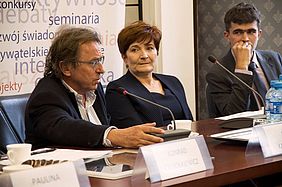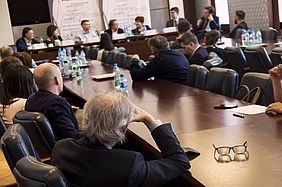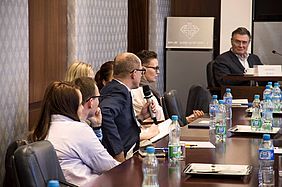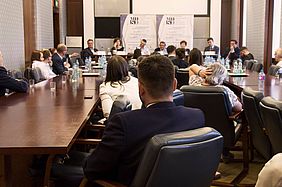The following speakers took part in the meeting: Prof. Andrzej Blikle, Konrad Ciesiołkiewicz (Orange Polska), Tadeusz Joniewicz (Forum Odpowiedzialnego Biznesu), Jacqueline Kacprzak, Dr Jerzy Kalinowski (KPMG Poland), Paulina Nesteruk (IKEA), with Wojciech Szeląg (Polsat television) as moderator.
The discussion began with the real meaning behind CSR (corporate social responsibility), and panellists agreed that there was a problem with CSR-inspired actions and measures. Prof. Blikle observed that CSR was largely considered as pure PR and marketing where CSR was supposed to make clients appreciate a certain brand and choose it over its competition – and that, our panellists agreed – has nothing to do with actual corporate social responsibility.
Jacqueline Kacprzak reminded us of the history behind the concept of CSR, as it all began back in 1976 when the OECD (Poland became its member in 1996) issued special guidelines for multinational enterprises. Apparently, this is the oldest standard of the socially responsible business, but the concept of ‘CSR’ is not included in said guidelines as responsible business conduct or ‘RBC’, was used in the original document. We were also reminded of 2011 when the UN unanimously adopted its business guidelines with special regard to human rights. However, some openly claim that CSR as such is no more and that only sustainable development is what remains of it.
The panellists agree that organizations are a big part of public life. Therefore, whenever we discuss responsibility, we should also talk of reputation, and not a business’s image – observed Konrad Ciesiołkiewicz of Orange Polska. Reputation is far more important, as it is hard-won and easily lost. On the contrary, one’s image is not so difficult to rebuild. The CSR as a trend may end, but only in terms of the ‘label’ – its name, but it is still very much needed as a concept.
Some say that CSR is nothing more but an unnecessary loss of funds, only affordable by large companies, and not small businesses. This, however, according to Tadeusz Joniewicz (Forum Odpowiedzialnego Biznesu) is wrong, as enterprises actually gain from CSR practices, even if they are not always aware of it. CSR-related activities, focused on employees, including for example, recruitment campaigns ensuring actual contracts of employment or optimization of fuel consumption, etc. are all measures that are mainly supposed to be beneficial, but at the same time they are also socially responsible.
Dr Jerzy Kalinowski of KPMG Poland thinks that the term ‘CSR’ is very wide as it concerns human rights, human resources management, environmental protection, fair business practices, consumer treatment, social development and general management of business. Therefore, CSR is not to be a purely additional and unimportant side-activity – it is very easy to verify how seriously CSR is treated at a given company.
CSR – consumer’s requirement?
According to Paulina Nesteruk (IKEA) consumers become more and more aware, as well. They are more demanding when it comes to socially responsible activities of large corporate entities. They actually expect corporations to be socially responsible. Clients begin to ask very particular questions about products, their origins, materials and suppliers used, sometimes clients are even interested in treatment of employees at a given corporation. When choosing a product, consumers in a way take on the responsibility of the business itself, as it is the consumers who make a given business profitable or not. That is why when a consumer chooses a given company, he or she wants to be certain that the company represents and protects certain values. Clearly, the price remains an important factor, but it is very likely to change, as even in Poland, people have more and more money to spend and will soon be able to actually afford to make an informed choice, based on more than just money. All companies should be aware of this and prepare themselves accordingly.
Employee’s market
Dr Jerzy Kalinowski of KPMG Poland observed that the young people, entering the employment market made their choices based on very different factors than their older colleagues. People born in1993 and later are very much interested in values that their potential employer represents and stands for. The young are more likely to choose their employer based on its values, and not the money it offers to pay. Also, employees are scarce these days, with this trend likely to become even stronger in the future. Therefore, it is to be assumed that within 5 – 6 years we will see the CSR-effect in the market – only those companies that invest in CSR will survive.
Employees as brand ambassadors
When discussing CSR in terms of a larger organization one should remember the need for dialogue to know what the expectations are and to try to meet them. Konrad Ciesiołkiewicz of Orange Polska believes that this where CSR-specialists come into play. We should ask them if people who engage in charitable activities are treated differently in terms of bonuses, etc.? We should ask if CSR-personnel is a socially active group? Do employees promote services and products of their company? These are the important questions touching on the issue of being a happy employee. Professor Andrzej Blikle added that more and more companies were focused on creating employee-friendly atmosphere – such companies want their employees to be proud of working for a given corporation, to identify with it and to go work enthusiastically. This actually proves beneficial also in terms of a given company’s financial success. Paulina Nesteruk (IKEA) then reflected on IKEA’s practices in terms of family relations and friendships, as it is the employees who are the real voice of the company and in a way represent the company – therefore, acting as its ambassadors.
Role of the state
During our debate we did have questions regarding enterprise-client relations. One of the frequent problems is the delay in payment by entities further up the supply chain. This is a standard practice known to business for many years and one that cannot be dealt with on client-supplier level. Therefore, there is a question of turning to the state and ask for assistance. The panellists suggested that the state could verify declarations regarding the term of payment with regard to the actual dates of payment. Currently, there is no provision of law in Poland that would require companies to disclose the actual date of payment for a service provided to such companies.
And when it comes to the state’s own practices with regard to its ‘business activity’ it should be observed that within the past few years the price had ceased to be the only criterium. The state is more open to social clauses regarding the employment of the people with disabilities or non-discrimination in companies.
CSR - myth, trend, necessity or choice?
In the opinion of our panellists CSR in Poland is very likely to develop further, even it will never involve spectacular initiatives (as these are not available to smaller businesses). In Poland, CSR is all about actual responsibility and sustainability in conducting business even if on the smallest of scales on the local level.


